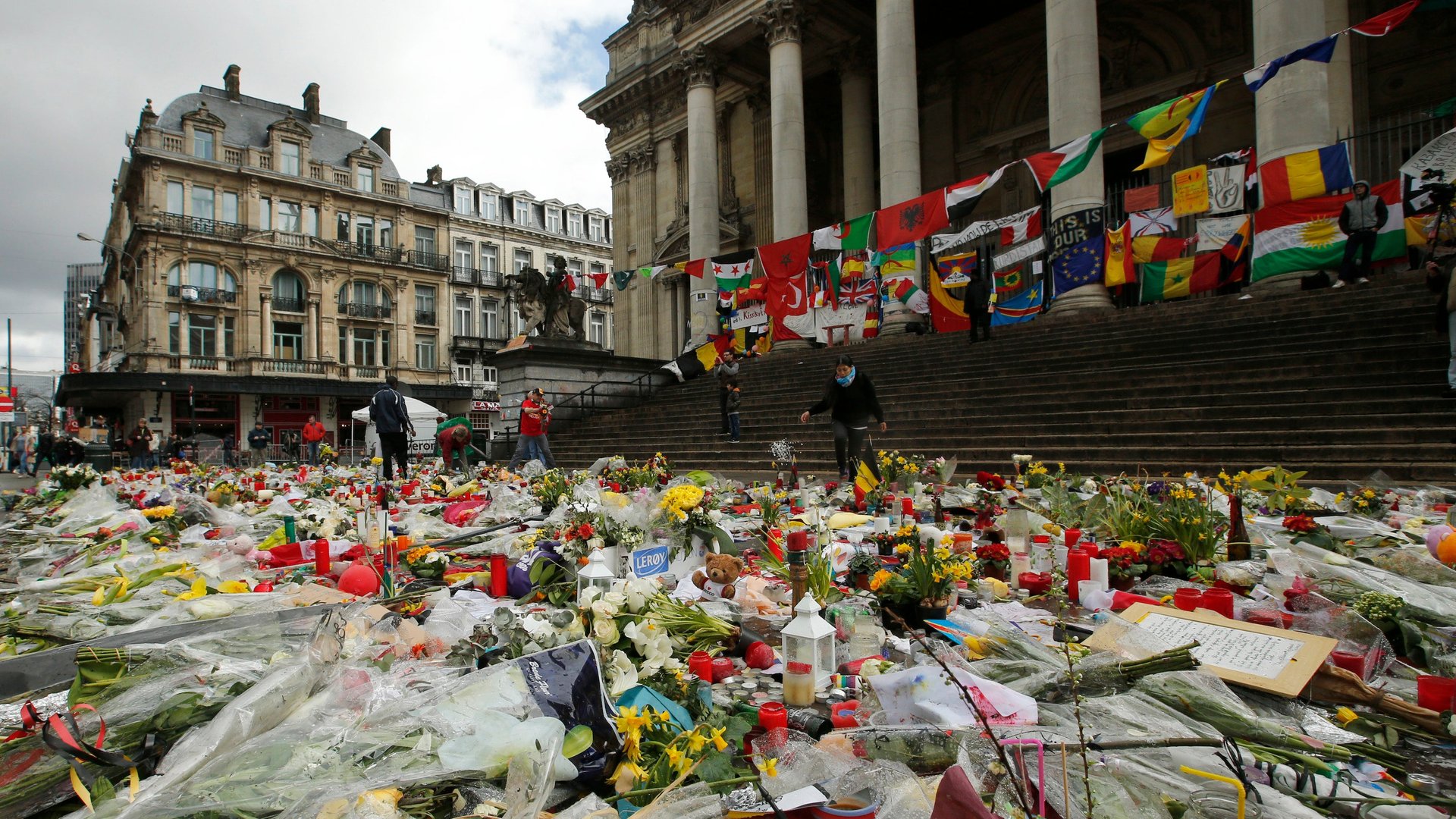Brussels shows that terrorism can dent an economy but rarely destroy it
The aftermath of terrorist attacks has become a depressingly familiar scene in Europe. Sirens from emergency vehicles pierce the air. Police cordon off roads that run through the city center, and soldiers man the checkpoints.


The aftermath of terrorist attacks has become a depressingly familiar scene in Europe. Sirens from emergency vehicles pierce the air. Police cordon off roads that run through the city center, and soldiers man the checkpoints.
After the sirens have fallen silent and the television crews have moved on, the effects of these attacks linger. Along with the toll of the dead and injured, the local economy frequently takes a hit. Flights are cancelled, meetings postponed, and holidays put off. In the aftermath of the terrorist attacks that claimed 32 victims in Brussels on Mar. 22, many in the Belgian capital are wondering how long it will take for life to return to normal.
If the other European cities to face terrorist attacks in recent years are any indication, Brussels’ chances of recovery are good.
“If you look at the experiences of other countries, after the London or Madrid attacks, you see the impact on the overall economy in the longer term is very limited,” says Bart Van Craeynest, chief economist at Belgian consultancy Econopolis. “The only examples where it can really destroy your economy is if it becomes a long-term campaign where you have several attacks following each other.”
Brussels has dealt with terrorism before. In May 2014, four people died after an attack on the Jewish Museum of Belgium. And last November, the city was put under a three-day lockdown as the authorities searched for people linked to the Paris attacks. But it’s still nowhere close to the position of, say, Northern Ireland in the 1970s, when paramilitary activity was at its height.
Brussels authorities’ reactions to the terrorist attacks seem to be evolving. In November, restaurants, cinemas, art galleries and schools all closed their doors. Soldiers patrolled the main shopping areas and military vehicles watched over prominent junctions, guns poking out of their roofs.
This time, after bombings at the Brussels airport and the Maelbeek metro station, businesses in the city did not shut down completely. Brussels’ metro, tram and bus networks all shut down, and its main art gallery, the Bozar, closed its doors. But bistros and bars kept on serving. In the European Quarter, the location of the Maelbeek metro attack, people were asked to stay inside during the day. But by the evening, an everyday atmosphere had begun to return, with rush-hour traffic backing up at junctions as usual. The next day, more people worked from home, but regular events like the weekly food market in Place du Châtelain operated as normal.
“It’s been remarkable. In terms of people getting on with their day-to-day lives it has been rather quick,” says Fabian Zuleeg, chief economist at the European Policy Centre, a Brussels think-tank.
The soldiers remain a high-profile presence, however, with far tighter security at key sites like the Gare du Midi train station, where high-speed trains shuttle travelers to and from London, Paris and Cologne. A heavy security presence may unnerve some visitors. But the economic case for Brussels as a site for business travel remains in place.
“The situation of Brussels as the de facto capital of the European Union but also as a logistics center in the middle of Europe means it is still attractive to companies,” adds Zuleeg. “I’m not expecting this to change.”
Data on business confidence and overall economic activity for the fourth quarter of last year from the National Bank of Belgium, the country’s central bank, suggests his predictions will be proven right. There was no noticeable impact on Brussels as a result of the November lockdown, and there is little reason to suppose the events of March 22 will prove much different.
There will be a short-term drop in visitor numbers, however, not least because the city’s main airport remains closed. Market research firm Euromonitor says visitor numbers could fall by 20% in the short term, but almost everyone expects a recovery before long. “Most of the activity has just been postponed and you will get it back later on,” says Van Craeynest.
In the meantime, the Brussels stock market offers an indication of how the city’s citizens and its economy are coping. The old Bourse building quickly became the centre of public commemoration, with messages remembering the victims chalked on the sidewalk outside. The site was briefly raided by right-wing hooligans on March 27, before police reasserted control with water cannon. The stock market itself dropped sharply on the morning of March 22, but recovered all its lost ground within an hour.
On the same day as the attacks, a long-scheduled seminar on jihadi radicalization happened to be underway at the EPC, on the edge of the European Quarter. Just before the seminar began, this reporter overheard a short conversation between two of the participants. “Were you afraid?” one woman asked a colleague, referring to the news of the bombings. “Me? No, I’m from Bamako,” he replied.
The exchange puts the attacks in perspective. While the events were a shock to Brussels, many other cities and countries suffer with far greater frequency. The Institute for Economics & Peace notes that just 2.6% of all terrorist deaths since 2000 have been in the West.
Indeed, just five days after the Brussels blasts, 69 people were killed by a Taliban attack in the Pakistani city of Lahore. But that didn’t stop the Asian Development Bank from releasing a report on Pakistan’s economy on March 30 forecasting an acceleration in economic growth this year. Terrorists may wield some power. But they inevitably lose in the face of cities’ resilience.